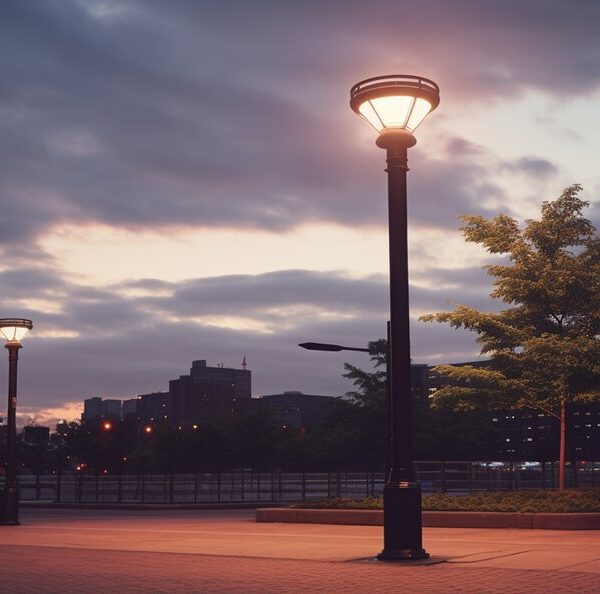In recent years, the adoption of renewable energy solutions has gained significant momentum across the globe, and Nigeria is no exception. Among the most impactful innovations is the installation of solar street lights, which are transforming communities by providing sustainable, cost-effective, and reliable lighting solutions.
For a country like Nigeria, where energy access remains a challenge for many, solar street lights offer a beacon of hope. In this article, we explore the top five benefits of installing solar street lights in Nigerian communities and why they are a game-changer for urban and rural areas alike.

1. Energy Independence and Reliability
One of the most significant advantages of solar street lights is their ability to operate independently of the national grid. Nigeria’s power supply is often unreliable, with frequent outages and load shedding leaving many communities in darkness. Solar street lights, however, harness energy from the sun, a resource that is abundant in Nigeria due to its tropical climate.
By relying on solar power, communities can enjoy consistent lighting without worrying about power cuts. This energy independence is particularly crucial for rural areas where grid connectivity is either unavailable or inconsistent. Solar street lights ensure that streets, markets, and public spaces remain illuminated, enhancing safety and productivity.
2. Cost-Effectiveness and Long-Term Savings
While the initial investment in solar street lights may seem high, they are incredibly cost-effective in the long run. Traditional street lights rely on electricity from the grid, which comes with recurring costs and maintenance expenses. Solar street lights, on the other hand, have minimal operational costs since they use free solar energy.
Additionally, solar street lights require little maintenance compared to conventional lighting systems. They are designed to withstand harsh weather conditions and have a lifespan of up to 25 years. Over time, the savings on electricity bills and maintenance make solar street lights a financially viable option for Nigerian communities, especially for local governments and community leaders looking to optimize budgets.
3. Environmental Sustainability
Nigeria, like many other countries, faces environmental challenges such as pollution and climate change. Solar street lights are a green alternative to traditional lighting systems, as they produce zero greenhouse gas emissions. By reducing reliance on fossil fuels for electricity generation, solar street lights contribute to a cleaner and healthier environment.
Moreover, solar energy is renewable and inexhaustible, unlike fossil fuels, which are finite and harmful to the environment. Installing solar street lights aligns with global efforts to combat climate change and promotes sustainable development in Nigerian communities. It also sets an example for other regions to follow in adopting eco-friendly technologies.
4. Enhanced Safety and Security
Well-lit streets are essential for ensuring the safety and security of residents. In many Nigerian communities, the lack of adequate lighting has led to increased crime rates, accidents, and a general sense of insecurity. Solar street lights provide a reliable solution to these challenges by illuminating public spaces, roads, and neighborhoods.
Brightly lit streets deter criminal activities such as theft, vandalism, and assault, making communities safer for residents, especially women and children. Additionally, solar street lights reduce the risk of road accidents by improving visibility for drivers and pedestrians. This enhanced safety fosters a sense of well-being and encourages social and economic activities to thrive even after sunset.
5. Economic and Social Development
The installation of solar street lights has far-reaching benefits for economic and social development in Nigerian communities. Reliable lighting extends the hours during which businesses can operate, allowing markets, shops, and vendors to remain open longer. This boosts local economies and creates opportunities for increased income and employment.
Furthermore, solar street lights improve the quality of life for residents. Children can study at night, community gatherings can take place safely, and public spaces become more accessible. The presence of street lights also encourages tourism and investment, as well-lit areas are more attractive to visitors and investors. By fostering a vibrant and active community, solar street lights contribute to overall development and progress.
Conclusion
The installation of solar street lights in Nigerian communities is more than just a technological upgrade; it is a transformative step toward sustainable development. From providing energy independence and cost savings to enhancing safety and promoting environmental sustainability, the benefits of solar street lights are undeniable. For a country with abundant sunlight and a pressing need for reliable energy solutions, solar street lights offer a practical and impactful way to improve the lives of millions.
As Nigeria continues to embrace renewable energy, the widespread adoption of solar street lights will play a crucial role in shaping brighter, safer, and more prosperous communities. It is a call to action for policymakers, community leaders, and stakeholders to invest in this innovative solution and pave the way for a brighter future.



